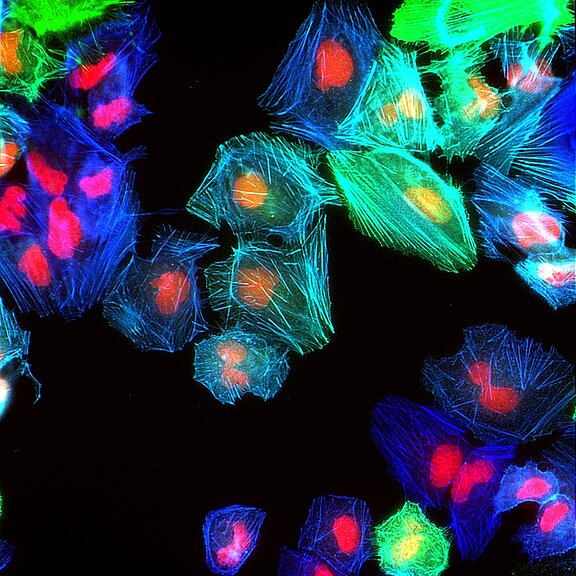
History
Foundation and development of the NMI
The state needs more application orientation
The impetus for founding the NMI came in 1983 from Dr. Günter Hoff, head of research in the "New Technologies" division at Friedrichshafen-based Dornier-System GmbH, and a member of the Baden-Württemberg Research Commission at the time. He proposed to the state government the establishment of a natural science research institute in thematic and spatial proximity to the universities of Tübingen and Stuttgart. This was intended to close the gap between academic and industrial research - a gap that was becoming increasingly threatening to the German economy in the early 1980s. Hoff's concept envisaged an interdisciplinary team of around 100 scientists developing findings from basic research into marketable technologies and products. The benchmark for the project was set by the best U.S. institutes.
At the time, the word "Em-Ai-Ti-le of Reutlingen" immediately made the rounds. Small but mighty, the NMI Reutlingen today ranks among the international elite of applied research in terms of quality in its fields of activity.
Foundation and first successful steps
The question of how a single federal state could promote high technology and sustainable technology transfer shaped the state government's economic and technology policy in the 1980s. As a visionary minister-president, Lothar Späth supported the plans to found the NMI and also lobbied the Federal Ministry of Research and Technology for support in 1984. The state of Baden-Württemberg initially secured funding of DM 10.5 million for the NMI until 1989. The newly founded NMI and six other affiliated institutes in Baden-Württemberg eventually became part of the state's innovation offensive and continue to serve as an essential instrument of economic promotion to this day.
Thus, on June 18, 1985, the NMI was founded and entered in the foundation register as the "Foundation for Scientific and Medical Research at the University of Tübingen in Reutlingen". Hoff became chairman of the foundation and director of the institute. The circle of founders included twelve well-known technology companies, mainly from southern Germany, and the city of Reutlingen. While the University of Tübingen was very skeptical of the "Hoff'sches Institut" with its business-oriented mission at the time and had great reservations about it, a cooperation agreement still underlines the special partnership relationship between the NMI and the university today.
Interdisciplinarity as a core idea, in contrast to academic research in individual disciplines, was a commitment of the NMI from the very beginning and has been lived throughout its history. Even in the early days of the institute, it was part of the requirement profile of the staff to bring a mindset that focuses on a close connection between basic research and industrial practice.
The NMI started with a focus on materials and interface research, and later added biochemistry, cell and molecular biology. The expertise of the staff with technical, engineering and/or scientific backgrounds was correspondingly broad - a hallmark of the NMI to this day. Numerous publications, patents and licenses reflect the success of the consistently interdisciplinary research at the NMI.
Proving itself in economically difficult times
The NMI's concept of being a link between basic research and industry was repeatedly put to the test. At the beginning of the 1990s, economic growth had reached a low point and medium-sized industry was holding back on research orders. After reunification, public spending on research also stagnated. The NMI underwent a process of contraction and was forced to reorganize. During the difficult period of transition, 1994 - 1995, Dr. Otto Inacker headed the institute on a provisional basis.
In April 1995, Dr. Enzio Müller took over as director of the institute. The broad range of topics of the early years was narrowed down, and the institute increasingly focused on the areas of biomedical engineering and surface and interface technology. The field of pharmaceuticals and biotechnology was defined as a new business area. The decision-makers at the NMI thus recognized early on how important biotechnology was to become as a cross-sectional technology for many industries. The strategic focus on core work areas, industrial projects and services initiated in 1997, together with industry-like management structures and control instruments, led to sustainable growth.
In 2008, Prof. Dr. Hugo Hämmerle, who had been deputy director of the institute until then, took over as institute director. During his tenure, Hämmerle oriented the institute primarily toward the life sciences and biomedical engineering. His name is closely associated with numerous spin-offs and successful projects and cooperations in the healthcare industry and application-oriented research. One effective example of his fruitful work to this day is the establishment of the RegioWIN Campus in the Tübingen-Reutlingen Technology Park, in close proximity to the NMI.
Prof. Dr. Katja Schenke-Layland has headed the NMI since April 2018 and, like her predecessors, stands for the successful transfer of innovation between science and industry. As Professor of Medical Technology and Regenerative Medicine at the Medical Faculty of the Eberhard Karls University of Tübingen, she has comprehensively expanded health research at the NMI and further developed it by restructuring and initiating numerous new collaborations with clinics at the University Hospital of Tübingen. Today, the focus is on research for translational and personalized medicine with developments for improved diagnostics, therapy and prevention. During her tenure, Schenke-Layland expanded the institute from around 120 to 200 employees and increased the annual budget from 14 million to almost 20 million euros.
Through her many functions in the national and international scientific community - whether as a member of the executive committee of acatech or as deputy chairwoman of the Central Ethics Committee for Stem Cell Research, as a spokesperson for the Baden-Württemberg Health Initiative or as an International Fellow of Tissue Engineering and Regenerative Medicine (FTERM), the Tissue Engineering and Regenerative Medicine International Society - Katja Schenke-Layland promotes the close networking and integration of the NMI into leading knowledge and value creation networks. In the spirit of translational research, she pursues a multidisciplinary, collaborative approach for the NMI and promotes the joint work of basic research, business-related research, clinical application and industry. A particular concern of hers is the further development of the Baden-Württemberg Innovation Alliance (innBW), which links the NMI with 11 other business-related, non-university research institutes in the state and which she represents with great commitment as a board member.






